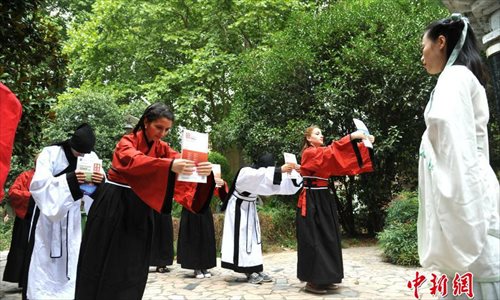Traditional Chinese greeting proposed to replace handshakes amid outbreak: political advisor
By Cao Siqi and Xu Keyue Source:Global Times Published: 2020/5/21 20:33:41

Foreign students from Anhui University donned traditional Hanfu costumes on Sept. 8. They also practiced bowing to their teachers like ancient Chinese in advance of China's National Teachers' Day, which falls on Sept. 10. (Photo/CNS)
A political advisor attending the ongoing two sessions has proposed to use a traditional Chinese greeting - bowing and saluting with hands folded - to replace the Western handshake, which may help prevent the spread of COVID-19.
Yang Chaoming, a member of the Chinese People's Political Consultative Conference, said what made him feel deeply was that this year's greeting etiquette seemingly changed while attending the two sessions as everyone is advised to keep social distancing instead of shaking hands with others.
Yang, who is also the head of the Confucius Research Institute in East China's Shandong Province, the hometown of Confucius, arrived at the important political event, which kicked off in Beijing on Thursday.
Yang on Tuesday sent the Global Times his proposal titled "Promoting the method of bowing and saluting with hands folded, inheriting traditional Chinese etiquette."
"The coronavirus is spreading all over the world and may coexist with humanity for a long time. We believe it's necessary to rethink the greeting etiquette - bowing to each other with our hands folded - which is simple and profound, acts to ease public concerns amid the epidemic and promote our cultural civilization and self-confidence," Yang said in the proposal. "Therefore, we should abandon the Western handshake and use the traditional Chinese greeting instead."
He noted a study showing that hand sweat glands are highly developed and using hands to greet other people may spread disease.
The traditional Chinese greeting is almost free from the limitations of time and space, and can be performed far away from each other, which ensures social distancing. Also, people can greet each other one by one, one to many or many to one, which is not only efficient, but equitable, said Yang.
Yang noted the greeting has actually been revived in some areas of China recently. In North China's Shandong Province, the Qingdao etiquette society has strongly advocated for resumption of the traditional greeting and a replacement the commonly performed one.
Yang proposed measures to implement the greeting. First, he advised to list the greeting in legal regulations and promote it as one of many public deeds in epidemic prevention. For example, government officials could take the lead and use it openly in important meetings, major events and daily life.
Yang also proposed to take advantage of networking platforms and social media when promoting the greeting.
In addition, the proposal said that teachers at elementary schools to university level can teach their students the greeting and set up examples on how to perform it and positively influence students.
Using such a greeting featuring bowing and saluting with clasped hands doesn't only build a health barrier, but also expresses comity and concession, which if long promoted can improve the social standing of citizens and revive Chinese national traditions and spirit, Yang said.
"Chinese culture is broad, inclusive and harmonious without uniformity. Previously we conformed to outside trends - using the Western handshake - however in the future we can adopt traditional greetings while using a critical lens," Yang said.
Besides of China, a similar proposal has gained momentum in other countries.
Anthony Fauci, director of the National Institute of Allergy and Infectious Diseases, one of the leading experts in the fight against COVID-19 in the US, told a Wall Street Journal podcast on April 8 that when the US begins to loosen lockdown restrictions, some behaviors must change.
"I don't think we should ever shake hands again, to be honest with you. Not only would it be good to prevent coronavirus disease; it would probably decrease instances of influenza dramatically in this country," Fauci said.
Amid the spread of the coronavirus, people are adapting India's "Namaste" greeting method, with the Royal family of the UK being a notable example. Prince Charles was seen greeting people with "namaste" at the annual Prince's Trust Awards on March 11 at the London Palladium.
Indian Prime Minister Narendra Modi in early March asked his people to avoid handshakes and start greeting others with "namaste" once again.
"Namaste" is a customary Hindu greeting pressing the palms of the hands together and normally accompanied by a slight bowing of the head.
Posted in: SOCIETY,小图DEPUTY